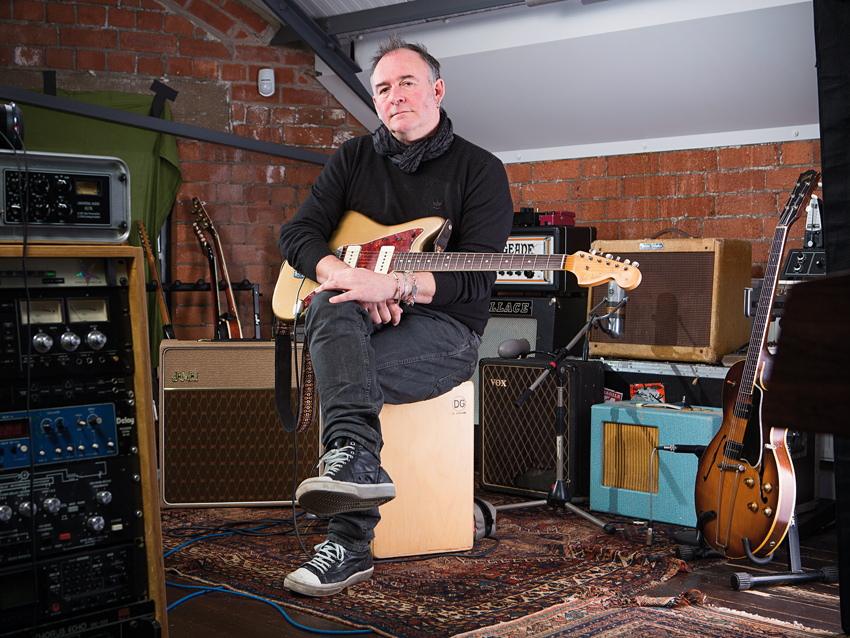
Portishead's Adrian Utley talks vintage gear and sonic adventuring
The guitarist behind Portishead’s ice-cool grooves, Adrian Utley is a restless sonic adventurer who’s made use of everything from Echoplexes to paintbrushes to explore the full sonic potential of the guitar.
He invited us down to his studio to talk about the creative techniques behind classic Portishead tracks, jamming with Jeff Beck, plus the vintage guitars and amps he relies on to produce a kaleidoscope of tones
The things that inspire guitarists to make a new kind of music are often surprising. For Adrian Utley, a jazz- trained player with a penchant for minimalist guitar, it was the brash and buoyant grooves of hip-hop that provided the inspiration for his straight- no-chaser guitar work with Portishead.
“I’d been interested in Public Enemy and the fact that you could take a drum loop or a break that was often Blue Note or James Brown, or whatever, and you could add other things like sub-bass or a ride over the top of it. Or it could be slowed down or you could chop it up into 16 bits,” Adrian explains.
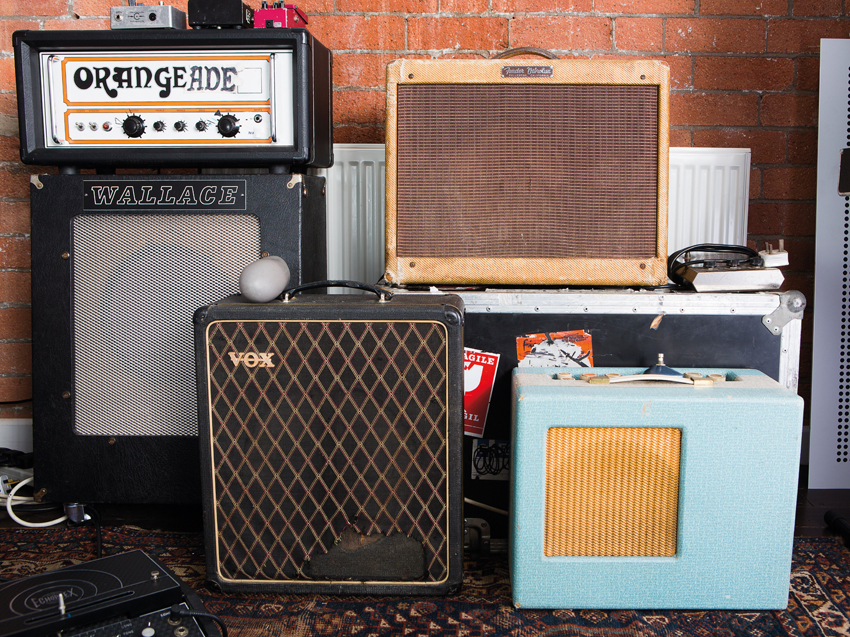
Adrian's amps
The other magic ingredient in the Portishead sound was the soulful, breathy presence of Beth Gibbons’ vocals.
The singer was already working with Barrow when Adrian joined the group – and the potent combination of their talents saw Portishead’s 1994 debut album, Dummy, go double-platinum and become the darkly enigmatic soundtrack to a nation’s post- club come-downs.
Although dormant for a time, Portishead are still very much a going concern, and played live shows in 2011. We ask Adrian if he embellishes on the records’ minimalist guitar lines in the live environment.
“No, we stick to it. The way we wrote it, or put it together, it works. And if you start pulling those bits apart and jamming, it doesn’t really have it any more. But over these many years, we’ve started to find space within that to make things glue a bit and develop things very slightly.”
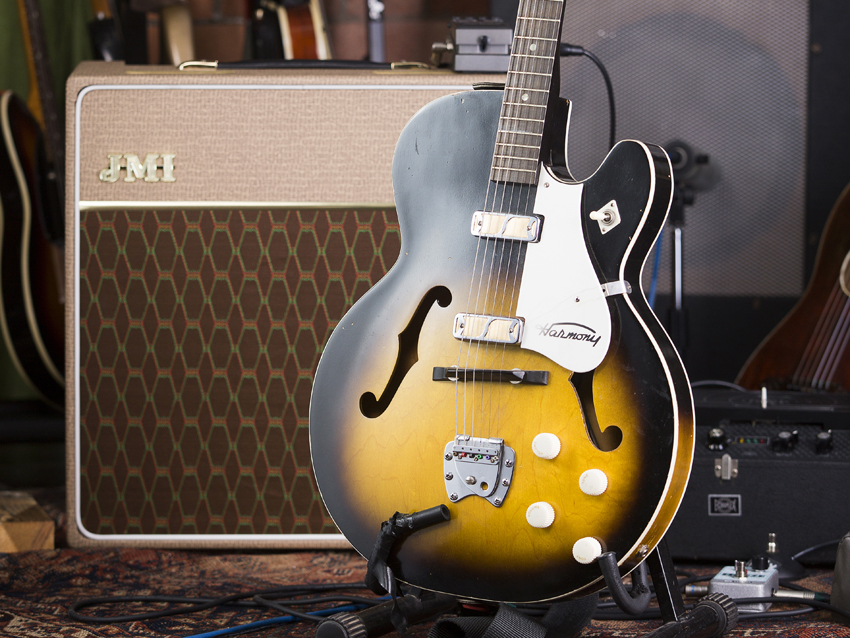
Harmony H-54 Rocket
Given that Adrian’s got serious jazz chops, we wonder whether the stripped- down Portishead guitar style ever feels restrictive to him.
“No, I come from a background of improvising, but hopefully not over- playing,” he says. “I’ve always been a minimalist, but I’ve liked improvising and playing guitar solos. I just absolutely don’t now want to play guitar solos. The solo in Glory Box was always a bit tongue-in- cheek, anyway, so I hate it when people cheer at the end of it. I always think: ‘No, please don’t do that!’ That’s not me going: ‘Yeah, I’ve got my cock out!’, it’s a piece of music, you know?
“I’m much more interested in playing orchestral music than I ever have been. I’ve got a guitar orchestra for up to 20, 30, or even 60 guitars. So, composition is more interesting to me than solos. Of course, I will listen to Jimi Hendrix forever – and people will say to me: ‘Oh, that’s a bit Hendrix-y.’ I suppose it’s the noise element: I was watching Star-Spangled Banner recently, and I’m interested in
that and the kind of screams of that stuff rather than being able to play solos.”
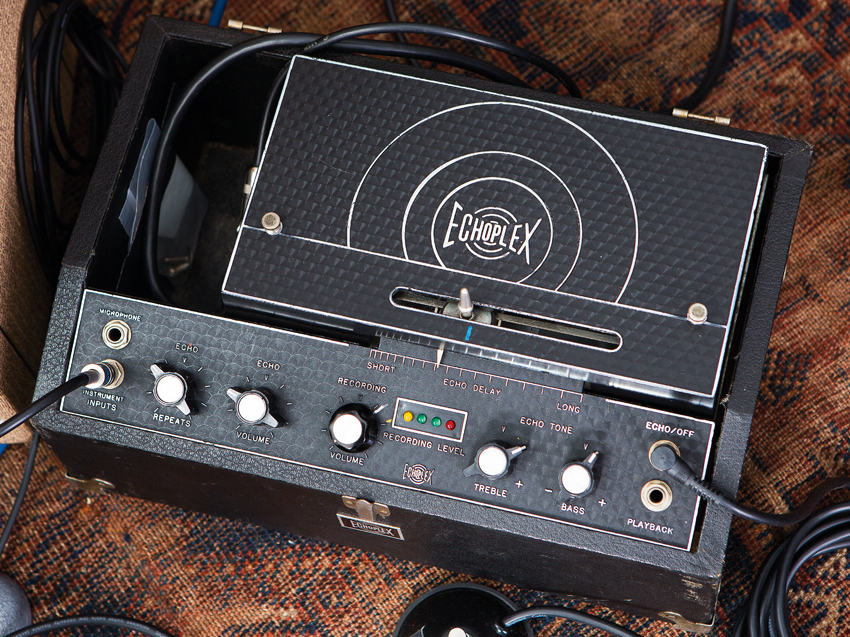
EP-4 Echoplex
As well as citing Hendrix as a major inspiration, Adrian’s also a big fan of Jeff Beck, and actually got to play alongside the former Yardbird when Beck recorded a rock ’n’ roll homage to Cliff Gallup, Crazy Legs, a few years ago.
“I played rhythm acoustic guitar, but in between times, I played Goodbye Pork Pie Hat with him because I knew the chords,” Adrian explains. “I also played Cause We’ve Ended As Lovers by Stevie Wonder. I used to listen to that until I nearly wore the record out – but to hear Jeff play it, I’m like: ‘F**king hell! What’s that chord?’ And he’d say: ‘Oh, I think it’s one of them...’, or whatever.
“Also, I played his ’56 Tele because he said: ‘Oh, have a go’. So, I played it, and he turned his amp up really loud, and I was just really embarrassed to play in front of him! But he turned it up even more, going: ‘Yeah, man!’ He’s just really into music and really encouraging.”
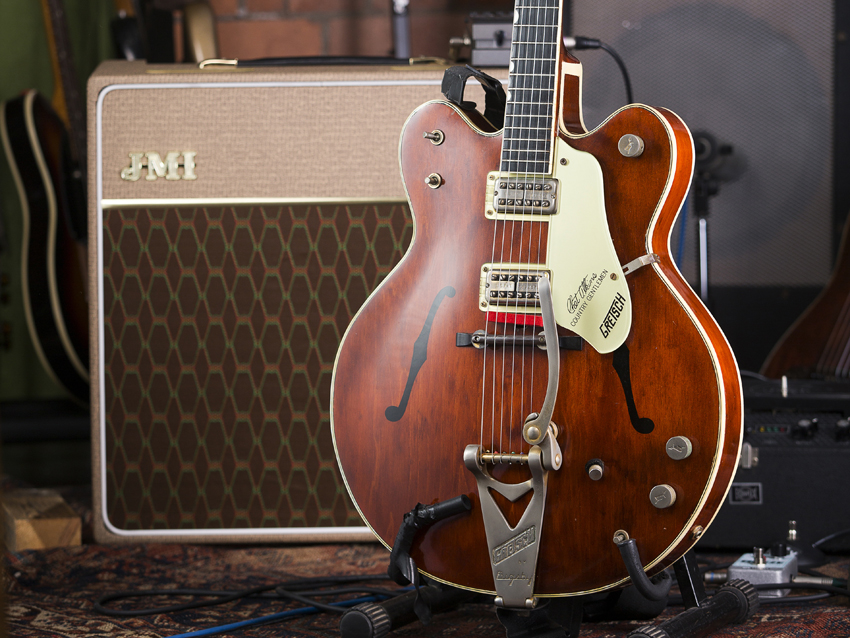
'67 Gretsch Country Gentleman
Adrian’s Bristol studio is an Aladdin’s cave of cool gear. As well as some seriously nice vintage guitars, it’s also home to a variety of low-wattage amps, many of which are British-built rarities. Adrian explains that he experiments with amps a lot when he’s searching for the perfect tone for a track.
“Amps are so important: if you’re an electric guitarist, then they’re half your sound, really. My first decent amp was a Vox AC30, then I went to Fender amps for a long time, and then back to Vox for the last 10 years.
“I think it’s working with John Parish, the guitar player with Polly [PJ] Harvey, who also uses Voxes. I went on tour with them and I had a Fender, but to my mind, they don’t break up nicely, unless they’re Tweed ones like Neil Young’s. Whereas when a Vox is just on the edge of breaking up, it’s just fantastic.”
“I’ve got two AC30s – they’re both ’62s. One of them came out from under a staircase. It’d been there since the 70s. I bought it from this old guy: I swear to God you’d think it was new, I did. It’s amazing. I actually wanted to put an old speaker in it, because there’s no sag at all. Even though it’s 50 years old, it’s really tight. Almost too tight – it’s got no bagginess in it. Whereas the other one I’ve got has been thrashed to hell, you know? It sounds great. I use them live, and at the end of
the tour, I’ve always got massive earache!”
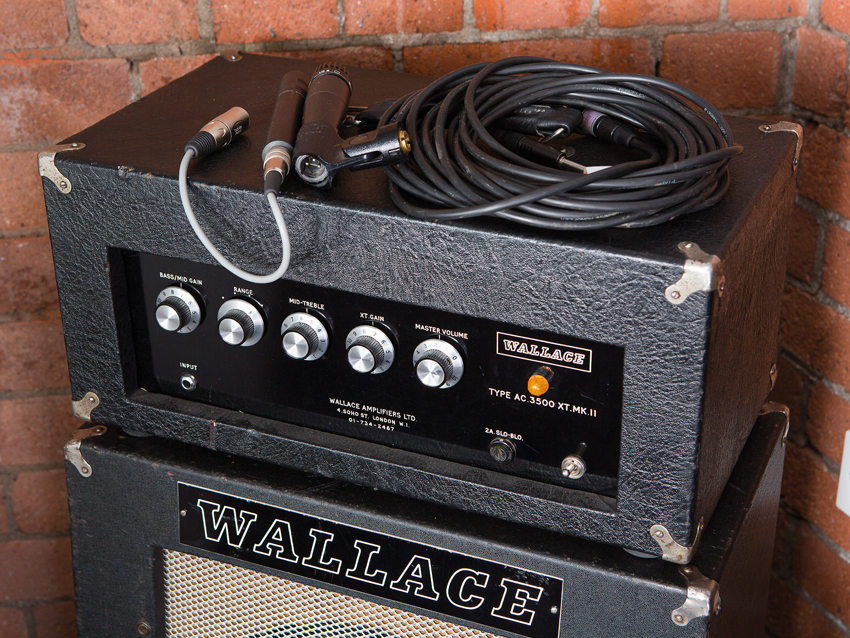
Wallace AC 3500 XT MKII Head
Despite enjoying a bit of sonic hooliganism every now and then, Adrian explains that he mostly turns to low- wattage amps in the studio.
“I’m really into really small amps. I’ve got a Supro Thunderbolt: you know, the 15-inch ones? And I’ve actually sent that to Beth, because she needs something that she can play bass through in the studio and for a bit of American-sounding guitar. It’s a lovely amp, but it’s too loud for me in here. But I think little amps sound great. I’m really agonising over whether to get a Vox AC4, an original one. It’s just because you don’t have to be deafeningly loud to get tones out. Even my JMI is way too loud for in here, and it’s only 15 watts.”
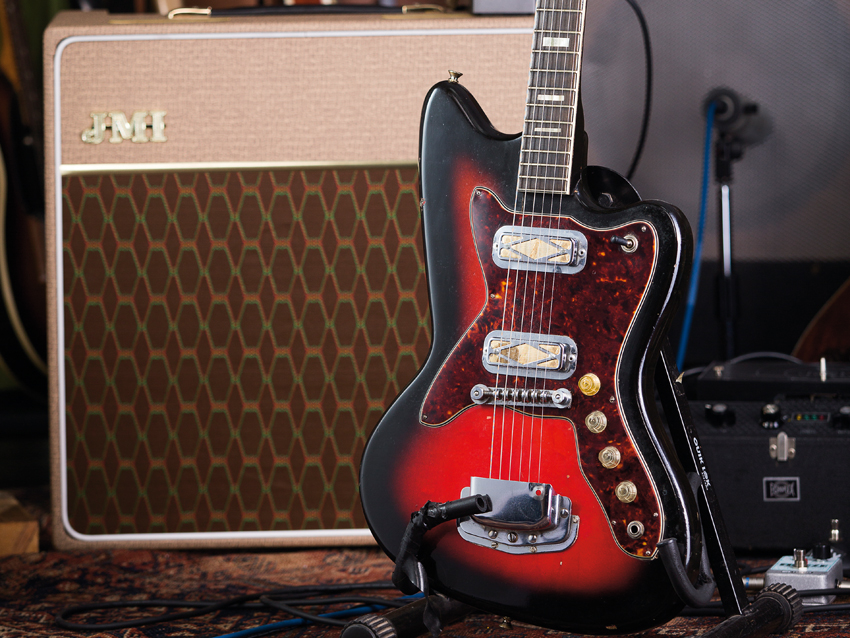
Silvertone Bobkat
With such an impressive arsenal of top- drawer vintage gear to choose from, Adrian never stops experimenting with new styles to keep his creative juices flowing.
As well as writing for his guitar orchestra project, he also plays with avant- garde jazz outfit Get The Blessing – but doubts he’ll return to playing standards.
“I never want to go back and play [straight] jazz,” he explains. “I have nothing against it; it just isn’t relevant to me any more at all. I never want to play Stella By Starlight again – although I love hearing people play it. And I don’t really want to play any groove-based organ stuff. I do get offered to do it, but I just can’t do it. My head is much more into Sonic Youth and the other things I do.”
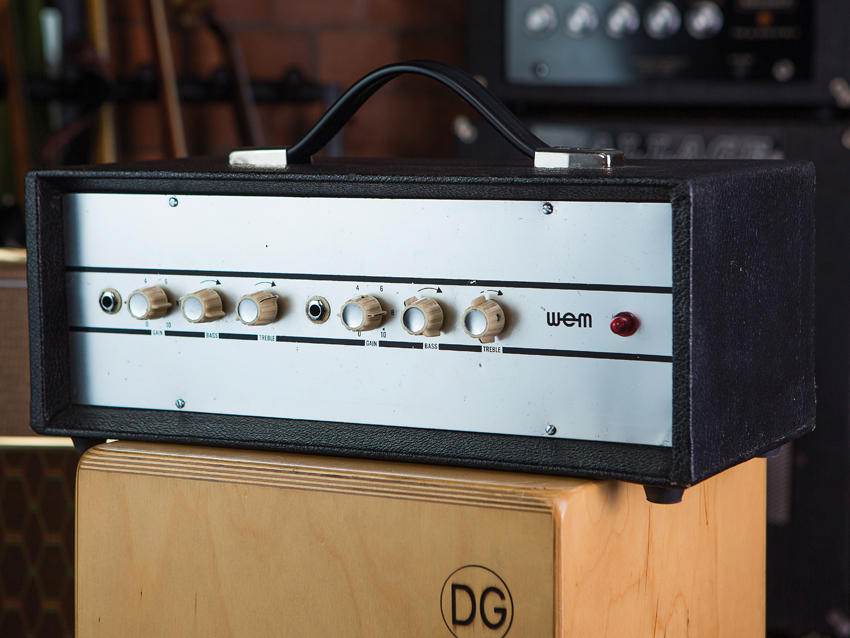
WEM ER-15
There have been rumours of another Portishead album in the pipeline, so we ask Adrian what he can tell us about that. He answers with a good-humoured shrug.
“There isn’t anything to tell you!” he admits. “We haven’t really done anything. We’ve been working on other projects: Geoff’s got a band called Beak, and I’ve got various projects. I’m just about to record for Invader Records – another bit of avoiding work for Portishead,” he quips. “Geoff’s got a label called Invader, and we’re going to do In C by Terry Riley, from the 60s. We’re doing that with 20 electric guitars and three organs.”
He adds that he’s a big fan of the Electro- Harmonix Freeze [Sound Retainer], and hints it might play a big role in his writing in the future, including, presumably, for Portishead. He also plugs in to show us how you can use a paintbrush’s bristles on the strings to summon up a whispering, shimmering wall of tone – then flip the brush round to use the handle as a slide. “I’m giving away all my secrets now,” he murmurs. But you get the sense this sonic explorer has got plenty more tricks up his sleeve for wherever he’s heading next.
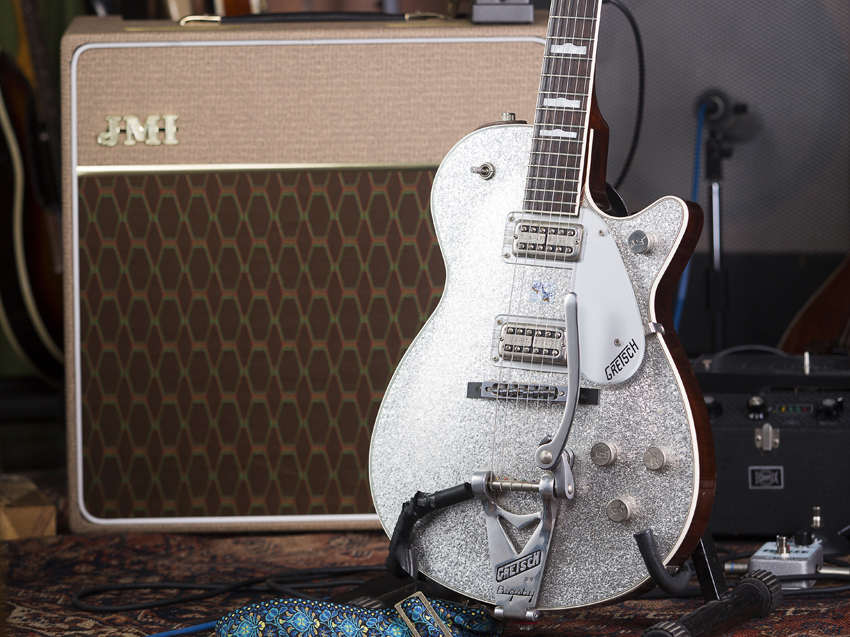
Gretsch 6129 Silver Jet
Who says you have to do things ‘properly’ in the studio? Adrian offers some memories on Portishead’s from- the-hip approach to mic’ing guitars...
“We once accidentally recorded a guitar with the back of a mic once, because me and Geoff [Barrow] were scrambling about. I was playing, and I said, ‘Geoff get that mic over there and put it on the amp’, and he put it up but he didn’t know which was front or back, and he couldn’t give a toss, either. He has this thing: he doesn’t care about mics, he’ll just EQ it until it sounds right and then I’ll be like: ‘Ah man, it sounds brilliant!”.
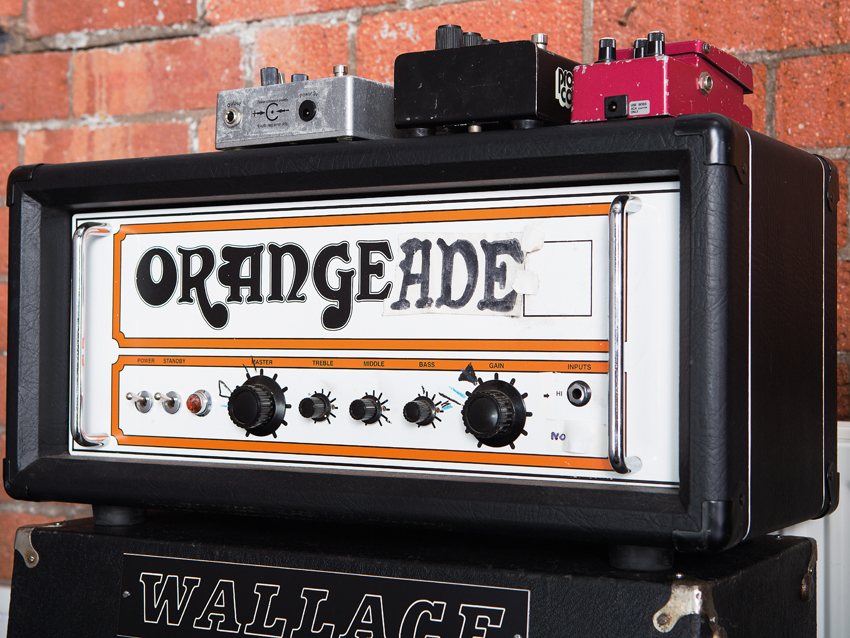
Orange AD30 Head
“Polly Harvey had one of these in the studio when I was working with her on Marianne Faithfull’s record," says Adrian if the AD30.
"I used hers for bass and guitar, then I got onto my guitar tech to see where I could get one. It’s fantastic, and Jimmy Page used one of these at the O2, I think. They sound brilliant – I’ve got a spare for touring, but that’s a two-channel model, and it doesn’t sound quite the same.”
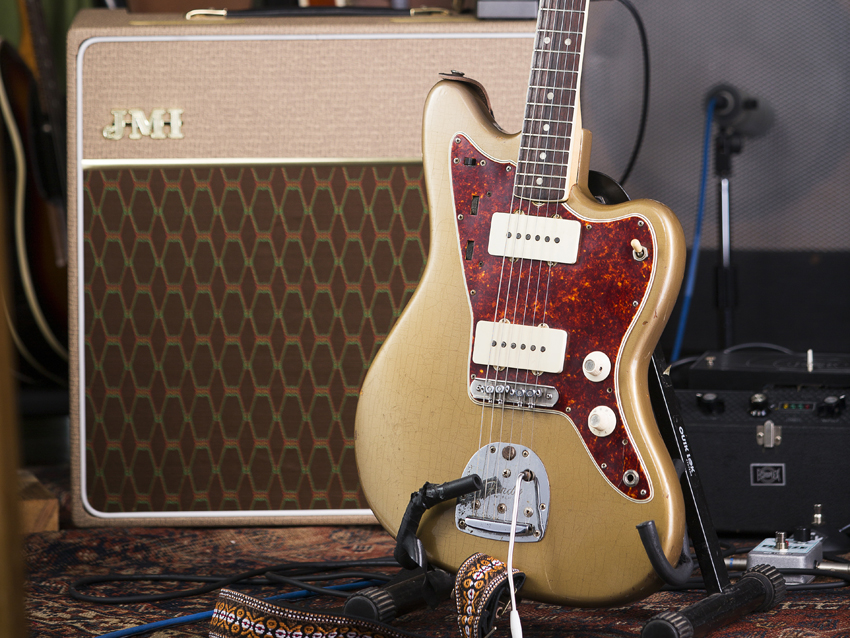
'65 Fender Jazzmaster
“I play this Jazzmaster all the time. It’s a ’65, and I really like it. The neck’s been refinished, but I’m gradually scrubbing that off with sandpaper, because I don’t like it when they’re too shiny," says Adrian
“I got this off this guy from Bristol. I played a 335 for years, which I hated – it was just the one I could afford, but it was a nasty one: it didn’t sustain. I’d always hankered after a Jazzmaster, though, so I got this probably five years ago, and it’s my main guitar. I borrowed it first to try it, and then I rang the guy that night and said: ‘I’ll have it.’
The whammy works really well – but I’ve got a shortened bar on there because they’re usually a bit too long for me. I had to change the bridge recently, too: the old one caused terrible buzzing, and there were loads of double notes going on.”
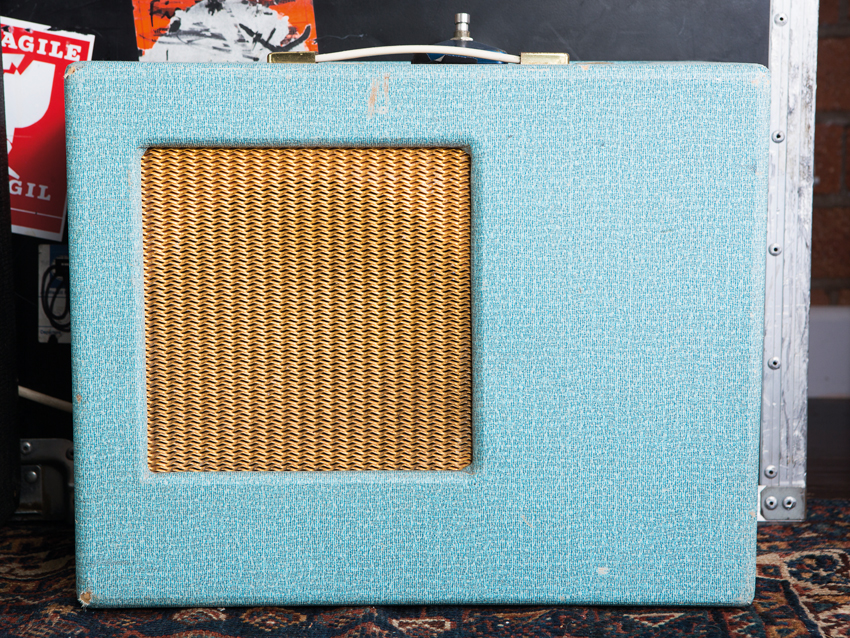
Watkins/WEM Westminster Combo
“I’ve had that a long time, and it’s nearly my number one studio amp," says Adrian of one of his favourite small amps.
I think it’s like a ’59 model or early ’60 or something like that. It’s similar to Vox circuitry, I think, and it sounds absolutely amazing. That’s a real favourite, and I record with it a lot.”
Guitarist is the longest established UK guitar magazine, offering gear reviews, artist interviews, techniques lessons and loads more, in print, on tablet and on smartphones
Digital: http://bit.ly/GuitaristiOS
If you love guitars, you'll love Guitarist. Find us in print, on Newsstand for iPad, iPhone and other digital readers


